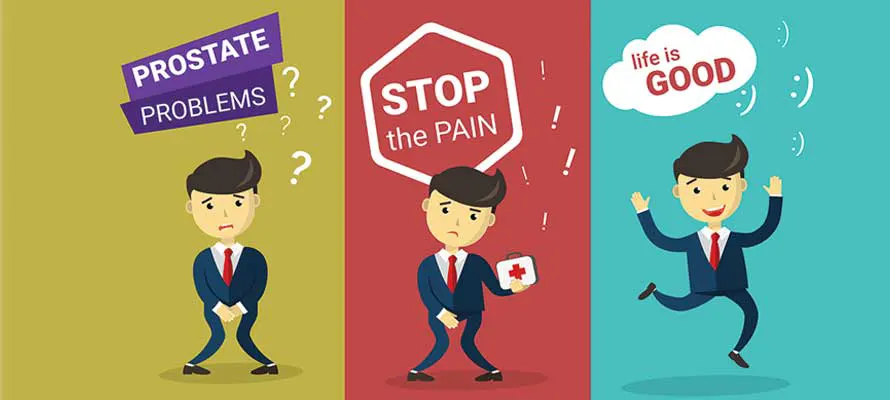What does declining prostate health mean?
Conditions that can occur which indicate declining prostate health are prostatitis and benign prostatic hypoplasia. Prostatitis happens to about half of men in their lifetime, and it refers to an inflamed prostate due to a bacterial infection. Symptoms include trouble urinating, burning when urinating, sexual problems and low libido, lower back pain, rectal pressure or pain, and painful ejaculation (1).
Benign prostatic hypoplasia is a condition that occurs when the prostate gland expands. It can then press against the urethra, leading to urinary problems like difficulty urinating, frequent urination, leaking, and a weak urine stream (1).
How does the prostate grow?
The prostate is enlarged because the cells in the gland begin to replicate quickly. The reasons for this are not completely known, but researchers think that hormones such as dihydrotestosterone begin to impact the prostate as a man gets older (2).
Enlarged Prostate Signs & Symptoms
There are a number of indicators which may mean that you have an enlarged prostate. Some of these include (1):
- Frequent urination, especially at night
- Stopping and starting during urination
- Difficulty starting a urine stream
- A weak urine stream
- Dribbling or leaking
- Feeling like the bladder is not empty
What are the causes of an enlarged prostate?
To understand the causes for prostate enlargement, we consulted with medical expert Dr. Laura Geige. She pointed out several factors that can contribute to the enlargement of the prostate, commonly known as benign prostatic hyperplasia (BPH). Age is a significant risk factor, as the prostate tends to grow larger as men age. Hormonal changes, particularly the imbalance between testosterone and estrogen levels, can also play a role. Other factors, such as family history, obesity, and certain medical conditions, may increase the risk of developing an enlarged prostate.
The prostate enlargement causes the cells to begin to multiply rapidly, increasing it’s size and leading to inflammation. The swollen organ presses against the urethra, making it difficult for urine to come through. This leads to dribbling and difficulty urinating. After a time, the area becomes more sensitive and you feel like urinating more often.
Risks for an Enlarged Prostate
There are factors which make the development of benign prostatic hypoplasia more likely, such as age. Men under 40 rarely develop BPH. By 60, a third of men have symptoms and by 80 it goes up to half. In addition, there is a genetic component. If a close male relative has the condition, it increases the chances that you will too. Men who have diabetes and heart disease have a bigger chance of developing BPH. In addition, obesity increases your chances of developing prostate enlargement problems (3).
Enlarged Prostate Treatments – How Do You Get Your Prostate Healthy Again?
There are a number of possible treatments for BPH. Which one is best for you depends on factors like your age, health condition, and how enlarged your prostate is. The treatments include (3):
- Medication: alpha blockers, 5-alpha reductase inhibitors, Tadalafil
- Surgery to reduce prostate swelling
- Minimally invasive therapies like embolization, laser therapy, prostatectomy
Foods to Treat BPH & Boost Prostate Health
A good diet for a man with BPH includes lots of fruits and vegetables – especially leafy green vegetables. You should also include whole grains bread and pasta, nuts, avocado, and healthy fats like olive oil. Avoid sugar, processed foods, sugary juices, and soda. Limit how much meat and salt you eat (4).
Prostate Enlargement – Yoga Stretches to Relieve the Symptoms
Anecdotal evidence suggests that yoga can be effective at diminishing BPH symptoms because it strengthens the pelvic floor. Here are a couple of good poses you might try:
- Hero Pose – You do this move in a seated position. Kneel down and lower your backside to the floor. You should be sitting with your knees on the floor between your feet. Your feet should be pointing towards the back of the room. Put your hands on your thighs, palms down. Sit as straight as you can, stretching out your spine. Hold for 5 minutes, then roll to one side to get out of the pose.
- Bow Pose – This pose involves lying on your stomach and bending your back. You begin on your stomach with your arms on either side. Then reach back with your palms upward and grab each of your ankles. Kick your heels upward and raise your head, chest, and shoulders. Keep looking upward and hold the pose for 30 seconds. Then repeat a second time.
Are there natural remedies that support prostate health?
There are a number of natural substances that are effective in supporting prostate health, including saw palmetto, pumpkin seed, Pygeum, zinc, plant sterols, and others. There are also some lifestyle changes you can make which can improve prostate symptoms.
For example, don’t drink any liquids 2 hours before you go to sleep. Make sure you avoid any product which could lead to dehydration. Exercise on a regular basis, as research shows it can improve the symptoms of BPH (5). In addition, you should try to stay at healthy body weight. Obesity can worsen the symptoms of BPH.
What are the potential side effects of invasive prostate treatments?
According to the American Cancer Society, prostate surgery runs the risk of leading to incontinence, which is the inability to control your urine. It may also cause erectile dysfunction.(6)
How common is prostate cancer?
This is the second most common form of cancer in men, and the fourth most common cancer overall. About 1 in 9 men develops prostate cancer at some point in their lives .
What causes prostate cancer?
Prostate cancer happens due to the development of abnormal cells in the gland which begin to multiply rapidly, eventually forming a tumor. There are also risk factors for developing prostate cancer. The older a man gets, the more likely he is to get it.
There’s a genetic component, so that if other close male relatives have developed it, you have a higher chance of getting it as well. For an unknown reason, African American men are more likely than other races to develop the symptoms of prostate cancer. Finally, obesity is a key factor. Men who are obese have a higher chance of developing this disease (7).
Is BPH the same as prostate cancer?
No, it is not. BPH involves inflammation of the prostate gland. On the other hand, prostate cancer is a tumor in the prostate gland or in that area. It is usually tested by giving a prostate-specific antigen test and/or a prostate biopsy. With prostate cancer, the levels of PSA are often elevated.
Prostate cancer symptoms can be similar to those for BPH, which as frequent urination, a weak flow, or nighttime urination. It may also involve blood when urinating or pain. Prostate cancer treatment may involve prostate surgery, radiation, chemotherapy, hormone therapy, immunotherapy, or cryotherapy.
How common is BPH?
There are very few cases of BPH in men below the age of 40. After 40, the incidence is 8-60%, with the highest incidence being at age 90 (8).
At what point should I seek treatment for BPH?
As soon as you begin to notice that you are having prostate enlargement symptoms like frequent urination, difficulty urinating, or prostate pain, you should see your doctor.
The physician will most likely give you a prostate ultrasound. They will also help you with treatment options, and it’s something they should know about right away. There’s a possibility that the symptoms could lead to kidney or bladder issues, so a medical professional should be watching your condition.
Do Supplements Help with BPH?
There are a number of helpful organic supplements on the market for treating the symptoms of enlarged prostate like Superior Prostate and Prostate PQ. They are high in anti-inflammatory properties which can lessen the swelling in the prostate and reduce symptoms. Most of them are also high in antioxidants which help with healing and boost your immunity and other ingredients that lessen symptoms. You may be able to take a supplement along with other treatments. Talk to your doctor and get medical approval first.
FAQ
Q: What is prostatitis?
A: Prostatitis is a condition which develops because of a bacterial infection in the prostate. The inflammation leads to the prostate pressing against the urethra. This can lead to prostate enlargement symptoms like frequent urination, burning during urination, painful ejaculation, and rectal pain (1).
Q: Can women get prostate cancer?
A: No, women cannot get prostate cancer because women do not have prostates. The prostate is part of the male reproductive system.
Q: Can a prostate supplement reduce the risk of developing prostate cancer?
A: The prostate supplements like ProstaGenix, Prostavec, and Prost-P10x claims to help raise your overall immunity, which could have some impact on lowering your risk of developing prostate cancer. It wouldn’t have a huge effect, however. Some early research showed that Selenium and Vitamin E, common ingredients in these supplements, can reduce prostate cancer risk. However, later studies found this to be untrue (6).
Q: Does BPH affect men of every age?
A: No, BPH rarely affects men under the age of 40. The incidence is roughly 1 in 9 men, but your chances are greater as you get older. The average age of diagnosis is 66.
Q: How does a doctor detect an enlarged prostate?
A: Initially, to detect an enlarged prostate, the doctor will ask you questions about your condition and give you a prostate examination. To confirm the diagnosis of BPH, the physician may conduct several tests such as a digital rectal exam, urine flow study, cystoscopy, a prostate-specific antigen (PSA) test, ultrasound, or prostate MRI.
Q: Can vitamin supplements cause prostate cancer?
A: A study published in Cancer Causes & Control, found a link between multivitamin use and an increased risk of prostate cancer.(9) However, more research is needed to confirm this connection. Always consult a healthcare professional before taking supplements.
Q: What are the most effective ingredients for prostate health?
A: There are a number of natural ingredients that are healthy for prostate function, including zinc, selenium, Pygeum, saw palmetto, stinging nettle, green tea, pumpkin seeds, beta-sitosterol, and ryegrass pollen extract.
Q: Can green tea cure BPH?
A: There’s evidence to indicate that green tea not only lessens the risk of developing prostate cancer, but it can also ease the symptoms of BPH. A study published in Therapeutic Advances in Urology found that supplementing with green tea led to improved urine flow, diminished inflammation, and a better quality of life.(10)
Q: Can pumpkin seeds improve my prostate health?
A: Pumpkin seeds are rich in nutrients that help prostate health. They contain plant sterols, which can lessen BPH symptoms. They can also even out hormone levels and prevent the multiplication of prostate cells. They are also high in zinc, which is a mineral that can inhibit the growth of prostate cancer cells (11).
Q: Can caffeine make BPH worse?
A: Caffeine is not suitable for men who have BPH, because it’s a diuretic which can make your urinary symptoms like frequent urination worse. Avoid it if you have prostate problems.
Q: Why do prostate supplements include zinc?
A: Zinc exists in very high concentrations in the prostate. It can regulate the levels of testosterone and dihydrotestosterone, which stimulate the growth of both healthy and unhealthy prostate cells. This is why supplementation with zinc is recommended for men with BPH 12.
Q: Are omega-3 fatty acids good for my prostate?
A: The research has been mixed on this issue. Although some studies initially found that omega 3 fatty acids reduce the risk of prostate cancer, later research found the opposite. According to Harvard Health Publishing, high levels of omega fatty acids can lead to an increased risk of prostate cancer.
Q: Why do so many prostate supplements include saw palmetto?
A: Saw palmetto is high in anti-inflammatory properties which lessens the swelling in the prostate and reduces urinary tract symptoms. The research on its efficacy has been mixed (13).
Q: Are prostate supplements effective?
A: There are many prostate health supplements on the market such as Prostate Plus and ProstateMD which are very effective, although there are others that are not. You have to do your research carefully before choosing a brand. In addition, you should get approval from your doctor before taking it.
Q: How do you separate the good products from the junk?
A: The key factor is the ingredients. Study the ingredients carefully before buying a product. It should contain plant sterols, zinc, selenium, and other organic substances like saw palmetto and pumpkin seed.
Q: What medications should I avoid if I have BPH?
A: There are several medications that can worsen prostate symptoms. The first are diuretics, which can make you urinate more frequently. In addition, antidepressants and drugs that treat spasticity are not for people with BPH. Finally, adrenergic drugs which contain decongestants can prevent the free flow of urine and can worsen BPH symptoms.
Q: What should I do if a prostate supplement is not working?
A: If a prostate supplement is not working for you, it’s not the right product and you should stop taking it. There are numerous supplements for BPH on the market like New Chapter Prostate 5LX, LES Labs Prostate Health, and Proquil, so you may want to have a look and choose one with slightly different ingredients. If none of the supplements work for you, stick with medical treatment like UroLift System or try alternative methods like a prostate massage.
Conclusion
Hopefully, this guide will provide you with all of the information you need to know to understand the workings of your prostate and to try to keep it as healthy as you can. It’s important to be in touch with your doctor and keep them apprised as to any changes in your prostate condition. That way if you begin to develop symptoms, you can get the right care immediately.
Sources
Health Insiders relies on peer-reviewed studies, academic research institutions, and medical associations. We avoid using tertiary references. You can learn more about how we ensure our content is accurate and current by reading our editorial policy.
[1] Understanding Prostate Changes and Conditions https://www.cancer.gov/types/prostate/understanding-prostate-changes#not-cancer
[2] The growing problem of an enlarged prostate gland https://www.health.harvard.edu/mens-health/the-growing-problem-of-an-enlarged-prostate-gland
[3] Benign prostatic hyperplasia (BPH) https://www.mayoclinic.org/diseases-conditions/benign-prostatic-hyperplasia/symptoms-causes/syc-20370087
[4] 10 diet & exercise tips for prostate health https://www.health.harvard.edu/mens-health/10-diet-and-exercise-tips-for-prostate-health
[5] Wolin KY, Grubb RL 3rd, Pakpahan R, Ragard L, Mabie J, Andriole GL, Sutcliffe S. Physical activity and benign prostatic hyperplasia-related outcomes and nocturia. Med Sci Sports Exerc. 2015 Mar;47(3):581-92. doi: 10.1249/MSS.0000000000000444. PMID: 25010403; PMCID: PMC4342314.
[6] Surgery for Prostate Cancer https://www.cancer.org/cancer/types/prostate-cancer/treating/surgery.html
[7] Prostate cancer https://www.mayoclinic.org/diseases-conditions/prostate-cancer/symptoms-causes/syc-20353087
[8] Lim KB. Epidemiology of clinical benign prostatic hyperplasia. Asian J Urol. 2017 Jul;4(3):148-151. doi: 10.1016/j.ajur.2017.06.004. Epub 2017 Jun 9. PMID: 29264223; PMCID: PMC5717991.
[9] Vitamin and Mineral Use and Risk of Prostate Cancer: The Case-Control Surveillance Study https://pmc.ncbi.nlm.nih.gov/articles/PMC2755205
[10] Katz A, Efros M, Kaminetsky J, Herrlinger K, Chirouzes D, Ceddia M. A green and black tea extract benefits urological health in men with lower urinary tract symptoms. Ther Adv Urol. 2014 Jun;6(3):89-96. doi: 10.1177/1756287214526924. PMID: 24883106; PMCID: PMC4003843.
[11] Effects of Pumpkin Seed in Men with Lower Urinary Tract Symptoms due to Benign Prostatic Hyperplasia in the One-Year, Randomized, Placebo-Controlled GRANU Study https://karger.com/uin/article/94/3/286/322765/Effects-of-Pumpkin-Seed-in-Men-with-Lower-Urinary
[12] Zinc and prostate cancer https://www.health.harvard.edu/newsletter_article/Zinc_and_prostate_cancer
[13] Kwon Y. Use of saw palmetto (Serenoa repens) extract for benign prostatic hyperplasia. Food Sci Biotechnol. 2019 Apr 17;28(6):1599-1606. doi: 10.1007/s10068-019-00605-9. PMID: 31807332; PMCID: PMC6859144.







 This article changed my life!
This article changed my life! This article was informative.
This article was informative. I have a medical question.
I have a medical question. Ask a Question
Ask a Question
 This article contains incorrect information.
This article contains incorrect information. This article doesn’t have the information I’m looking for.
This article doesn’t have the information I’m looking for.